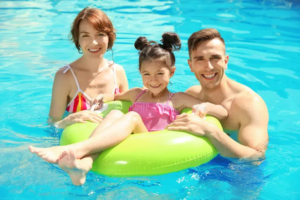After conception, humans spend about nine months being nurtured within a water-based environment…so, what should we do to nurture ourselves “after the water breaks”?
It is generally understood that swimming is “essential” for “human life” in regards to safety, especially for children, who are at high risk of drowning…which is one of the leading causes of death for children under five years old. This alone gives reason to enroll your child in a quality swimming lessons taught by true pros, who can familiarize your child with aquatic environments (slippery surfaces, ladders, swim equipment, toys etc.), teach them safe habits(no running, unsafe jumping, excessive horseplay, misuse of ladders, etc.) and most importantly, train them to become competent strong swimmers (buoyant body positions, effective use of arms/legs, breathing techniques, stamina building, etc.).

What is overlooked or forgotten sometimes, is that beyond being “essential”, swimming is one of the great “enhancers” to “human life” in regards to well being. It all begins with the first experiences as an infant and can last throughout a lifetime. The excellent feature about swimming is that it is inclusive & communal like no other
activity. In general, swimming on a regular basis helps not only physical strength, it also encourages humans to maintain and expand their “mental-emotional courage” to overcome life’s challenges.
Some examples of enhancement for each age group are:
Parents w/infants using swimming as a bonding activity as the parents begin to handle their children in and around water with more finesse and confidence while the child begins to look towards the parent for safe guidance.

advertisement
At early childhood, children learn to separate from the parent and spend time with an instructor in a lesson, which helps them develop trust in a non-family adult, and also, to function safely in a water environment with other children in the group. It is important to note that when there are a few (not too many) other children in the lesson, there is more stimulation and socialization, and thus development will be faster and more realistic going forward (than a “one-on-one” lesson). In general, children who swim release excess energy and thus eat, sleep, concentrate on their studies better. Of course, body strength, coordination & fitness and better overall health will result from regular visits to the pool.
Teenagers who have grown up swimming have already developed the high level of discipline it requires to become proficient in the water. This gives them a “tool” to maintain fitness as their body goes through many changes. The discipline can also be a crucial ally as they move into this “complex” period of their life. For example, it gives them a healthy social group to function within. Also, they begin to have access to lifesaving courses and jobs within the aquatic industry such as lifeguarding. Their future prospects are bolstered for college, as swimmers tend be in or near the top of their classes academically and are regarded highly by insitutions considering student applications.
In adulthood, the stresses of job and/or family life can be reduced significantly by regular swim visits. Also, if you have moved to a new city or country, it’s a great way to instantly meet people outside your job or neighborhood. Also, of course, there is the challenge of keeping fit while avoiding injury… and swimming is the answer.
For families, swimming provides an activity in which everyone can participate and a link to the community on a relaxing, healthy & positive basis. Families can fill many hours of a holiday around the pool or at the beach…the kids never get tired
of repeat visits to the water.
Throughout the second half of your life, swimming can help you maintain your mental and physical quality of life. You can remain alert and soothe your aches & pains. Also, it gives you an opportunity to stay socially involved.
Special swim programs for people who are mentally and/or physically challenged or for people in need of rehabilitation after injury are becoming more and more advanced & available. The water does wonders for these groups of people.
Swimming makes a bad day better and a good day great…so, “Swim For Your Life”, to be safe and as a way to maintain life-long well being!














